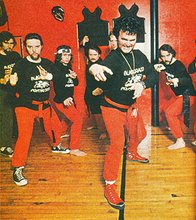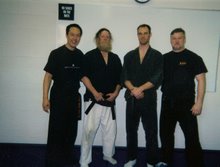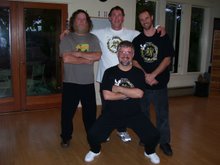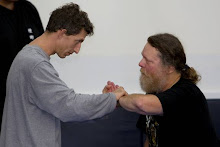
Wow!
From The Huffington Post:
Why I Got Fired From Teaching American History
by Thaddeus Russell
Five years ago, I had every reason to believe that my job as a history professor at Barnard College was secure. I had been teaching there for four years, I had published my dissertation with a major publisher, and because I had tripled the sizes of the introductory U.S. history course and the American Studies program, colleagues told me they "would be shocked" if I were not promoted to a tenure-track position.
But that was before my colleagues knew what I was teaching.
I had always been a misfit in academia, partly because of my background, partly because of my personality, and increasingly over the years because of my ideas -- ideas that are now a book called "A Renegade History of the United States."
I was raised by pot-smoking, nudist, socialist revolutionaries as an egghead white boy in black neighborhoods in Berkeley and Oakland. I nearly flunked eighth grade and finished high school with a C average. Then I went to the anarchist, ultra-hippy Antioch College in Ohio, which accepted all their applicants, didn't give grades, and didn't have a history department.
So even though I managed to pull myself out of that background and into and through Columbia for a PhD, then onto a job at an elite college, I was highly uncomfortable moving from the world of weed to the world of tweed. I hated being "Professor." I cursed in class. I talked about sex. I used politically incorrect terms. My students said they had never heard the things I was teaching them in class. They called me "Bad Thad."
I showed them that during the American Revolution drunkards, laggards, prostitutes, and pirates pioneered many of the freedoms and pleasures we now cherish -- including non-marital sex, interracial socializing, dancing, shopping, divorce, and the weekend -- and that the Founding Fathers, in the name of democracy, opposed them. I argued not only that many white Americans envied slaves but also that they did so for good reason, since slave culture offered many liberating alternatives to the highly repressive, work-obsessed, anti-sex culture of the early United States. I demonstrated that prostitutes, not feminists, won virtually all the freedoms that were denied to women but are now taken for granted. By tracing the path of immigrants from arrival as "primitives" to assimilation as "civilized" citizens, I explained that white people lost their rhythm by becoming good Americans. I presented evidence that without organized crime, we might not have jazz, Hollywood, Las Vegas, legal alcohol, birth control, or gay rights, since only gangsters were willing to support those projects when respectable America shunned them.
This was not the standard left-liberal perspective my students had heard, and it certainly wasn't a conservative one, either. It was informed by an unlikely mix of influences, including the hippies and other cultural radicals I had encountered in my early life, black and gay cultures that showed me a way out of the self-imposed limitations of being white and straight, and libertarians who caused me to question the commitment to freedom among the left that I had been born into and which employed me as a professor.
I gave my students a history that was structured around the oldest issue in political philosophy but which professional historians often neglect - the conflict between the individual and community, or what Freud called the eternal struggle between civilization and its discontents. College students are normally taught a history that is the story of struggles between capitalists and workers, whites and blacks, men and women. But history is also driven by clashes between those interested in preserving social order and those more interested in pursuing their own desires -- the "respectable" versus the "degenerate," the moral versus the immoral, "good citizens" versus the "bad." I wanted to show that the more that "bad" people existed, resisted, and won, the greater was what I called "the margin of freedom" for all of us.
My students were most troubled by the evidence that the "good" enemies of "bad" freedoms were not just traditional icons like presidents and business leaders, but that many of the most revered abolitionists, progressives, and leaders of the feminist, labor, civil rights, and gay rights movements worked to suppress the cultures of working-class women, immigrants, African Americans, and the flamboyant gays who brought homosexuality out of the closet.
I had developed these ideas largely on my own, in my study and in classrooms, knowing all the while that I was engaged in an Oedipal struggle to overthrow the generation of historians who came of age during the 1960s and 1970s, controlled academic history, and had trained me. They were so eager to make the masses into heroes that they did not see that it was precisely the non-heroic and unseemly characteristics of ordinary folks that changed American culture for the better.
So I was quite anxious when I was asked to present my work to colleagues in order to get a long-term contract and be moved into line for a shot at tenure. A friend in the history department told me that given my publishing record and popularity among students the talk would be "really just a formality." But I knew it would be trouble.
Several distinguished professors from Columbia showed up, since the university has final say on all tenure decisions at its sister college, Barnard. During my talk, a Columbia professor who had been named by a national magazine as the most important public intellectual in the United States, stared at me with what I took -- rightly, it turned out -- to be disgust. Another walked out before I finished. One of my graduate school advisors asked a series of hostile questions. Other colleagues told me after the talk that I was "courageous," that I was "wonderfully, relentlessly revisionist," and that I made some famous historians "look like dinosaurs."
But emails came into the hiring committee from "important places," I was told, calling my ideas "improper," "frightening," and "dangerous." They said my ideas had no place in the academy and insisted that I be terminated. It was simply not okay for me to describe the "oppressed" in the terms used by their oppressors -- "shiftless," "sexually unrestrained," "primitive," "uncivilized" -- even though my argument transformed those epithets into tributes.
After I was told that I would be leaving Barnard, hundreds of students protested in faculty and deans' offices and the Columbia Spectator devoted an editorial to my case, but to no avail. There did indeed seem to be no place for me in the academy. And so I wrote a book.
Amazon link













12 comments:
DJR, I was kind of hoping you have some commentary. This was very interesting stuff - you could almost imagine him speaking and how interesting the class would have been.
Yea,
I don't quite know what to make of it, but it sure brings up some interesting ideas.
Like all the liberties that organized crime brought us. Someday we'll probably say that about pot growers...
I'd like to get this book, and Howard Zinn's "A People's History of the United States".
Wow the real Tea Party made its way on to Dojorat!
This guy is the anti-Zinn, and that's a good thing, Zinn was a doofus.
Nobody should get tenure anyway, certainly not someone advocating freedom.
Thad is of course right, crime and corruption open up spaces for experimental business, art and lifestyle. Kind of reminds me of the the Declaration of Independence 'though, I don't buy his argument that the founding fathers were all uptight...what about libertine Hamilton? Without him we wouldn't have even had a country!
I'd like to read the People's History as well, it's always been on the "get around to" pile.
Wrong-o Scott-o.
The Tea Party of it's day was the Temperance ladies. Ban alcohol. Roll back liberties. Authoratarianism.
Try again Mr. revisionist.
And this just in from the founder of the "Tea Party":
Tea Party ‘founder’: Palin, Gingrich a ‘joke’
A financial blogger and ex-CEO credited with being one of the original "founders" of the Tea Party has come out against the movement, saying it has been hijacked by the very people it was protesting and is now obsessed with "guns, gays and God."
In a "message" to the Tea Party Wednesday, Karl Denninger declared that he "ought to sue" anyone who uses the Tea Party name "for defamation."
"Yeah, that's a joke," he writes. "But so are you. All of you. Especially Sarah Palin, Newt Gingrich, Bob Barr, and douchebag groups such as the 'Tea Party Patriots.'"
Denninger writes: "Tea Party my ass. This was nothing other than the Republican Party stealing the anger of a population that was fed up with the Republican Party's own theft of their tax money at gunpoint to bail out the robbers of Wall Street and fraudulently redirecting it back toward electing the very people who stole all the ****ing money!"
Denninger runs Market Ticker, a financially-focused blog that has been strongly opposed to bank bailouts and has railed against excessive government spending. He founded the group FedUpUSA in early 2008, shortly after the collapse of investment bank Bear Stearns.
http://www.rawstory.com/rs/2010/10/tea-party-founder-slams-tea-party/
Hi!
inspiring article for the history teacher in Sarko' France that I am...
And I do recommand Zinn's book...
Thanks
Erwan
Anyone claiming to be the founder of the Tea Party is mentally deranged. It is a mass movement that sprang up over night from all over the place. If you are inside the Tea Party you know what it is about, otherwise you don't, and it's funny, because of that fact the Tea Party is way more powerful than people realize. (Like Tai Chi theory, "I know you, you don't know me.")
The new movie Red (Retired, Extremely Dangerous) is a Tea Party movie. Check it out.
I don't know why you call me a revisionist, but I've been called worse. You are surely correct-- there are similarities between the Tea Party and the 1920's movement which banned drinking at the same time as it gave women the right to vote.
Just so we are clear, I believe in guns, whiskey, sex, and the Constitution.
It's kind of funny, I read Zinn's book in this class on "critical thinking" that was taught by a guy from Guinea. He loved my review of the book so much he read it to the class. It's long lost but I said something like, "Zinn spends 500 pages giving us examples of how inspired rebellions against American power always fail, and then ends with the hope that some day the lazy civil servants down at City Hall will get together with the cops over at Hunt's Donuts and we'll have a revolution!"
Tea Party.
Sarah Palin
Christine O'Donnell
and Rand Paul.
Right-Wing religious authoritarin conformists and Bigots.
Constitution?
O'Donnel didn't even know what the first amendment was in her last debate.
Come on. If you're a smart guy you know this is just a front by uber-corporate Fucks that are desperately trying to rally a base. Look at the Koch brothers and Dick Armey, the people that fund the TP.
We Uber-Corporate-F..ks are the base...those folks with names are just trying to ride the wave.
Fascism should rightly be called Corporatism, as it is the merger of corporate and government power.
Benito Mussolini
Post a Comment